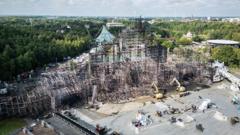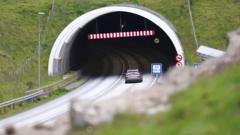Following a fire that plunged Heathrow Airport into darkness and caused significant flight disruptions, British authorities have initiated an investigation to understand the incident's implications for the nation's energy infrastructure and overtime planning.
Fire at Heathrow Airport Sparks Investigation into Energy Resilience

Fire at Heathrow Airport Sparks Investigation into Energy Resilience
An electrical substation fire left Heathrow Airport in darkness, disrupting over 1,000 flights and raising concerns over the UK's infrastructure.
Heathrow Airport, the busiest airport in Europe, was plunged into darkness on Friday due to a fire at an electrical substation, leading to the cancellation of over 1,000 flights and chaos for thousands of passengers. The incident prompted the British government to launch an urgent investigation to assess the causes of the fire and its impact on national infrastructure.
Energy Secretary Ed Miliband emphasized the need for a thorough understanding of the situation, stating, "We are determined to properly understand what happened and what lessons need to be learned." As a result of the closures, many passengers found themselves stranded, with some facing days of delays in reaching their destinations.
Despite the chaos, Heathrow announced it would return to a full flight schedule of over 1,300 flights on Sunday to alleviate the backlog, with more than 250,000 passengers processed on Saturday alone. However, the fire, which is thought to have been accidental, raised significant concerns regarding the resilience of critical infrastructure, particularly the statewide energy systems.
Experts immediately began questioning the reliability of Heathrow’s energy provision, with Professor Martin Kuball of the University of Bristol commenting on the outdated technology in existing substations. He stated, “Unfortunately, there is no resilience built into the National Grid,” pointing to the reliance on older technologies that could be limiting the effectiveness of energy distribution.
The British government has faced growing calls to modernize its transportation infrastructure amidst pressures from public services like healthcare, which are underfunded. As Prime Minister Keir Starmer is concurrently navigating demands for increased military spending amid stagnant economic growth, any push for necessary infrastructure investments could create political challenges.
The authorities anticipate preliminary findings from the investigation to emerge within six weeks. Transport Secretary Heidi Alexander underscored the urgency of the situation, noting that Heathrow requires power equivalent to that of a small city and stressing the importance of understanding the power failure to safeguard future operations.
As Heathrow reopens and flights resume, the focus now shifts to ensuring that such an incident does not happen again, which could not only disrupt travel but pose risks to national security and energy reliability. The investigation's outcome will be crucial for informing future investment decisions in the UK’s critical infrastructure.






















